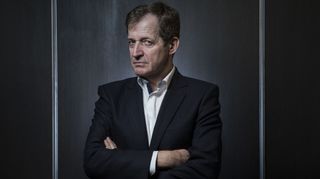Alastair Campbell: “It’s Not a Book About Happiness, It’s a Book About Winning”
Tony Blair’s former communications director, now an author, on the urge to win

Your book is about winners. What made Tony Blair one?
He had some of the qualities you’d expect to see in a sports champion, such as an obsession with detail and an absolute determination to win. One of my favourite headlines about Tony was in an Australian magazine, which called him “A nice kind of bastard”. That showed he wasn’t just a charismatic guy, he was very tough as well. He definitely had an inner steel which the public didn’t necessarily see.
Which other leaders do you admire?
Angela Merkel is very impressive. Because of the electoral system in Germany, she’s never actually commanded a majority. She’s always had to work back-room deals and respond to different pressures, so her success is all the more remarkable. In sport, it’s Haile Gebrselassie. If you watch videos of him at his peak, you’ll see that he runs in a lopsided way, and that’s because when he was a kid he had to run miles to school and back, always carrying his books under the same arm. He’s never forgotten that, and he has a real humility despite his huge fame and fortune.
In the book you talk about Michael Phelps teaching himself to dream about swimming, so he could concentrate on winning the Olympics for 24 hours a day. Can people be too ambitious?
Given what he was trying to do, he needed to have that level of focus. I gave a talk about the book and a woman said, “There don’t seem to be many happy people in there”. I told her it’s not a book about happiness, it’s a book about winning. Look at Tiger Woods, who wouldn’t let his wife throw a celebration party after he won a golf tournament because, in his mind, he was supposed to win.
Is being a winner all about self-confidence?
It has to be authentic. Alex Ferguson told me that every time he went into a team talk, he bounded in with his chest puffed out, exuding authority and control. But if you’re not a natural leader, trying to act the big “I am” isn’t going to work.
So the rest of us are doomed to mediocrity?
No. Even though none of us will ever play chess like Garry Kasparov, or run a business like Richard Branson, we can learn a few techniques by studying them. A prime minister, say, might not be feeling confident when he walks into a room, but he’ll learn to calm himself and switch on a light bulb in his head before he enters. Sometimes it looks like they’re painting on a smile – and that’s exactly it.
What one thing made you successful?
My nervous breakdown in 1986. I was only 28 and I had just been promoted to a high-powered job on Fleet Street that I was too young for. I was drinking heavily under all the pressure and I cracked up. Luckily, after a few months of recovery, my old boss at the Mirror offered me the chance to start again from the bottom, which saved me. I still suffer from depression, but I have a yardstick now. If I’m feeling down, I can compare it to the breakdown and it’s never as bad. Most successful people have gone through a terrible period that strengthened them. The Irish running coach Colm O’Connell expressed it best: “The winner is the loser who evaluates defeat properly.”
What slogan do you swear by?
The first thing I do when I open a new notebook is write “OST” in the front. It stands for Objective, Strategy, Tactics. If you check yourself all the time against that, you will do well: what is the objective, how are we going to get there, what steps can we take now? To give you a trivial example, I really wanted my book to get to number one on the bestseller list. That was my objective. My strategy was to do a blitz of publicity and get it talked about. And the tactics were to promote it hard for each TV show, newspaper, festival and event I appeared at. And I’m happy to say it worked.
Get the Coach Newsletter
Sign up for workout ideas, training advice, reviews of the latest gear and more.
Winners: And How They Succeed by Alastair Campbell is out now (Arrow paperback, £9.99). Buy on Amazon
Grub Smith contributed interviews and features to the print edition of Coach, which ran from 2015 to 2016.
